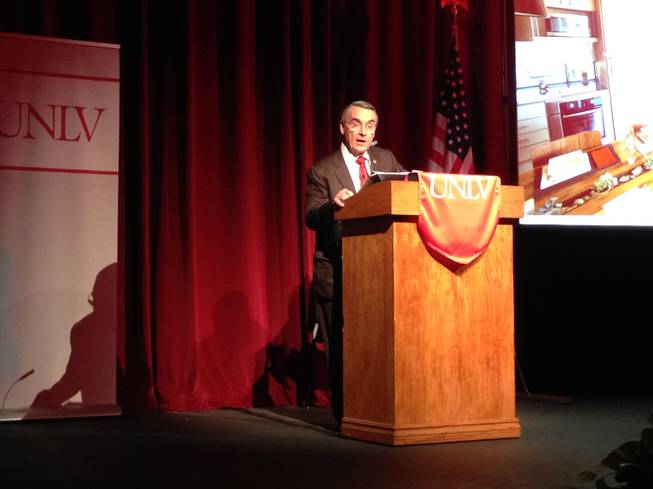
UNLV acting President Don Snyder presents his State of University address at UNLV’s Judy Bayley Theatre on Thursday, Sept. 18, 2014.
Thursday, Sept. 18, 2014 | 3:59 p.m.
Change is on the horizon at UNLV, acting President Don Snyder said today during his State of University address.
Snyder laid out his vision for UNLV’s future. He said that by 2034, he envisions a medical school rooted in community research, a drone and robotics program at the forefront of innovation, a global Harrah College of Hotel Administration and a tier-one-ranked university by the Carnegie Foundation.
To get there, Snyder told the crowd of over 400 at the campus’ Judy Bayley Theater, this year will be one of foundation building. “This is a year of great changes for UNLV,” he said.
It won’t be an easy road to reach tier-one status.
Only 108 schools have received the designation, which would place UNLV among the top 2.3 percent of schools. Snyder said it could take UNLV 10 to 20 years to attain the status.
The university will have to improve its substandard six-year graduation rate of 43 percent. The national average is 55 percent, which is exceeded by tier-one schools.
It will also need to double its grants and contracts, increase its number of doctoral students, and reinvest in faculty and the campus after years of budget cuts. Not only that, but the Nevada System of Higher Education must finish its search to find a permanent president for the school.
“Part of making UNLV a world-class institution must include ensuring that the campus is literally built for success, where the facilities and co-curricular offerings attract and retain students,” Snyder said.
UNLV has formed a Tier One Initiative executive committee and a subcommittee of university stakeholders to identify critical areas UNLV must improve.
The school also hired Academic Leadership Associates, which played a key role in improving the University of Southern California. Reaching tier-one status could triple the university’s economic impact, increasing it from $1.5 billion to $4.5 billion through grants and research projects and by attracting businesses.
Snyder said the university has taken steps toward its goal.
The school has plans to build a new Harrah College of Hotel Administration building, and it received approval to include funding for its medical school in the Nevada System of Higher Education’s budget request.
UNLV also beat out several universities to obtain Intel’s Cherry Creek supercomputer, which is considered the 400th most powerful supercomputer in the world. The supercomputer will be stored at Switch’s SUPERNAP data facility and is expected to be a catalyst for research and economic development, Snyder said.
His presentation included a flying drone provided by Skyworks Aerial Systems, which was founded by two UNLV students, and a video that highlighted the university’s innovation in gaming. Each were a glimpse into the future, Snyder said.
Snyder said he envisions a future in which UNLV is an “academic brand name,” professors have resources to apply for more grants and student innovation is the norm.
“It’s time to take stock of where we are and to put plans in place to realize the dreams that we all share,” Snyder said. “We’ve been through a lot, especially during the Great Recession...But, we’ve made it through with purpose and vision for what we can — in fact, must — become.”

Join the Discussion:
Check this out for a full explanation of our conversion to the LiveFyre commenting system and instructions on how to sign up for an account.
Full comments policy